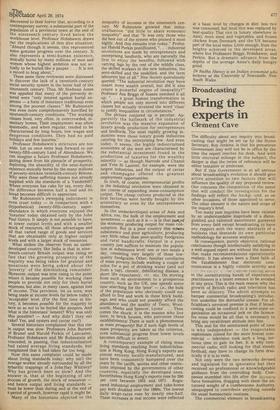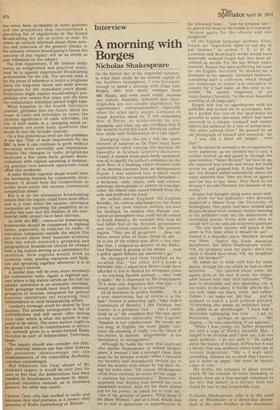Broadcasting
Bring the experts in
Clement Cave
The difficulty about any inquiry into broadcasting that might be set up by the Home Secretary, Roy Jenkins, is that his precarious Government may well not be in office by the time the report reaches his desk. And with little electoral mileage in the subject, the danger is that the terms of reference will be either tentative or irrelevant.
But if this Government is at all serious about broadcasting's evolution it should give active attention to two factors that will influence the quality of any proposed review. One concerns the composition of the panel that will conduct the investigation for the findings will reflect the backgr und, as on other occasions, of those appointed to serve. The other element is the nature and scope of the inquiry's brief. Too many past inquiries have been vitiated by an understandable inaptitude of a distinguished and talented assortment garnered from every field except broadcasting to have any rapport with the many abstracts of a business that demands its own particular methodology for accurate analysis. In consequence, purely objective, rational conclusions though intellectually satisfying in a well-argued report are without the nuances that make recommendations operationally realistic. It has always been a fixed faith of the Establishment that electronic communication is a highly volatile activity and
.:ht-> . the r.ecialm runrting amok in the unrestraining hands of experienced practitioners is a latent menace to be avoided at any price. This is the main reason why the growth of British radio and television has been so dilatory. The adroit attempts to hamper commercial broadcasting's introduction underline the distrustful unease. For officialdom's unvoiced premise is that if broadcasting could be confined to a semi-state organisation an occasional jerk on the licencefee reins would be all that is necessary to bring any recalcitrant attitude into line.
This zeal for the uninformed point of view is why independent — the respectable euphemism coined for the more honest commercial — television took such a long, tortuous time to gain its feet. It is why commercial radio, still looking for that steady foothold, may have to change its form drastically if it is to exist. Not only were the two networks devised and legislated for in ignorance but they received no professional or knowledgeable guidance from the controlling body. Companies stumbled into life after the licensing farce formalities, dragging with them the untutored weight of a cumbersome Authority, unequipped to contribute anything outside the usual bureaucratic routines.
The commercial element in broadcasting has never been acceptable in some quarters and the prejudices that incorporated a shackling list of regulations in the Sound Broadcasting Act are as active as ever. So unless an outlook informed about these niceties and conscious of the general climate in the industry reviews broadcasting's future the outcome of any inquiry will be as sterile as past reflexions on the subject.
The first requirement, if Mr Jenkins really wants an enlightened and practical study, must be to appoint experienced broadcasting professionals for the job. The second need is for the terms of reference to invite a prognosis about the long-term future and some precise inspiration for the immediate years ahead. Projections might explore broadcasting's possibilities over twenty-five years and the form the evolutionary transition period might take. What happens to the fourth television channel, glimpses into the future about the shape of radio and television to come, the ultimate significance of cable television, the role of both media in a changing social environment are some basic questions that would fit into the broader concept.
On a less pretentious level are the problems of the day. That of most importance for the BBC is how it can continue to grow without becoming more unwieldy and impersonal. Despite the changes in radio programme structures a few years back, greater decentralisation with regions assuming a dominating position over network operations could offset this weakness.
A more flexible regional shape would meet the increasing demand for community involvement. It would help the Corporation to tackle more easily the intense commercial competition ahead.
But it is on the alternative broadcasting system that the inquiry could have most effect and at a time when the smaller television companies are reporting the possibility of no profits this year and the frailties of the commercial radio project have been obvious.
As with the BBC, commercial broadcasting frameworks should be considered in regional terms, especially in relation to radio. If television companies outside the major five are worried about their business economy then the whole network's grouping and geographical boundaries should be revised with a big station serving as a centrepiece for satellites. New regions would work as economic units, pooling resources and facilities and operating together whenever it is in the group's interest. A similar plan will be even more necessary for commercial radio. Again, a regional pattern where a big station serves as the hub for smaller operations is an economic necessity. Such groupings would have much enhanced prospects of success, integrated for general business operations yet retaining their independence in local broadcasting affairs. London's coverage could be shared by four stations. The present arrangement is full of contradictions and will never offer serious local radio which is what the system is supposed to be about. The news station ought to be phased out and its commitments to service the network given to a newly-formed Radio Division as part of Independent Television News.
The inquiry should also consider the principle whereby stations can lose their licences for persistent shortcomings yet the misdemeanours of the controlling Authority continue unchallenged. But whatever the final shape of Mr Jenkins's inquiry it would be nice just for once to feel that the deliberations had been handled by broadcasters, leavened by distinguished outsiders instead, as is standard practice, the other way round.
Clement Cave, who has worked in radio and television here and overseas, is a former .chief executive of Radio Luxembourg in Britain.



































 Previous page
Previous page